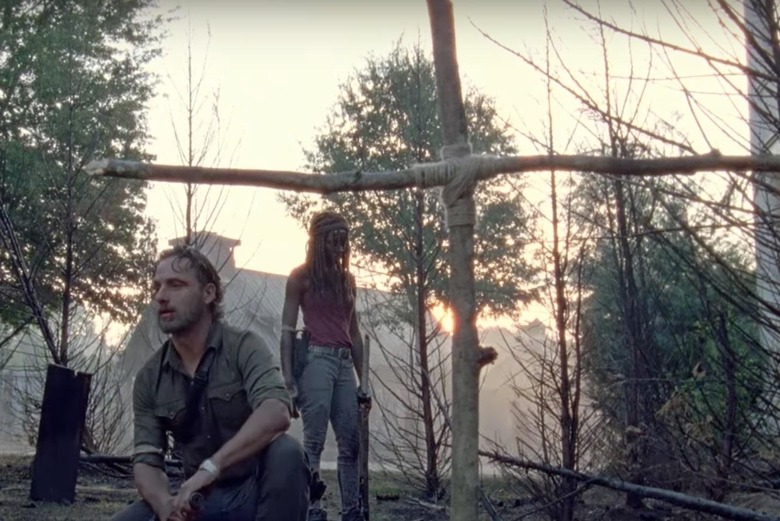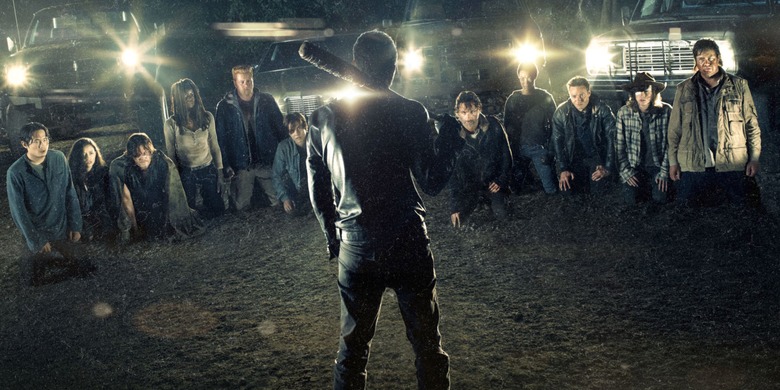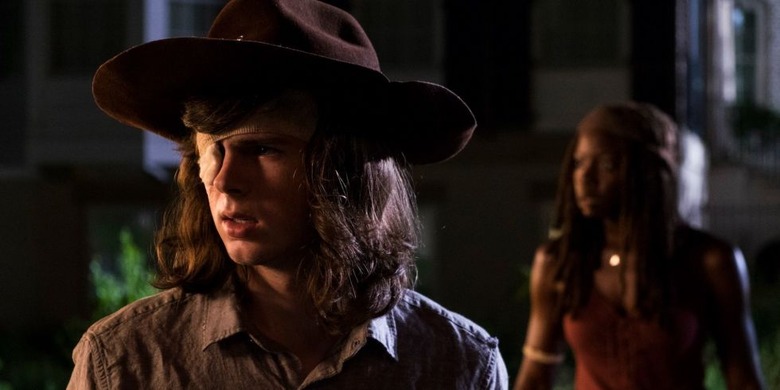'The Walking Dead' And The Case Against Killing Off Television Characters
(This post contains immediate and major spoilers for The Walking Dead.)
Carl Grimes is dead. In all the seasons of The Walking Dead so far, I don't think anyone would have guessed that one of the zombie apocalypse's casualties would be Carl, one of the show's original and longest-running characters. For many fans, a show without Carl is like a show without his dad, Rick – it just wouldn't be The Walking Dead. It would be a completely different show that didn't sign up for.
You would think the creative team behind The Walking Dead would respect that. But instead, they have thrown caution to the wind and committed one of the most asinine decisions in the show's history. They killed Carl. What's even worse, they killed him without any ascertainable reason.
Carl isn't The Walking Dead's first unfortunate tragedy. The show is littered with the bodies of characters who should still be alive, but somehow aren't. These characters were cut down in their prime, full of storylines and pathos and potential to be mined. But all they were used for is to show, once again, how brutal a zombie world can be.
The Walking Dead is beginning to be a victim of its own circumstances. In order to show how hardcore living with zombies is, the show's go-to tactic is to show a beloved character dying, either by zombie attack or by some other bloody tragedy. But just how many times can a show, one that's designed to showcase death on a grand scale, actually draw from the death well? How many times can it show fan favorites die without it feeling like a habit or lazy writing? Thanks to The Walking Dead, we now have our answer.
Desensitized to death
"...I'm left more annoyed than sad," said Forbes' Erik Kain when writing about Carl's death. "I'm thinking about just how many characters this show has killed off, and I've come to the conclusion that killing main characters that audiences have come to love should only be done incredibly sparingly. Killing off Carl to shock us, to bump ratings momentarily, to give us an 'emotional episode' like last night's – this is a mistake."
Kain's right in his aggravation. The Walking Dead regularly misuses the shock value of death as a shorthand for portraying a hardened, frontier-esque world. The main purpose of killing characters in a story, if you do it at all, is to make a point about the story's theme in the most absolute terms possible. It's an exclamation point on the message the story is presenting. One of the most famous deaths in comic books, that of Peter Parker's Uncle Ben, highlights exactly what he meant when he told Peter "with great power comes great responsibility." But a character death must be organic to the story in order for the audience to feel its weight and for it to feel justified. A character death, in other words, is a sacred thing.
Writing experts have had discussions about killing characters for years, and those conversations have never been more valuable than right now during this time of the character killing zeitgeist. Reading some of these experts' suggestions showcase just how far off the mark The Walking Dead has been when regarding the gravity of death.
K.M. Weiland, author of books Outlining Your Novel, Structuring your Novel, and founder of the writing website Helping Writers Become Better Authors, wrote in an infographic that some good reasons to kill a character are to advance the plot in a meaningful way, to fulfill "the doomed character's personal goal," to motivate other characters, to act as karma for a character's actions, to emphasize the story's theme, to create realism within the world of the story, or to kill an extraneous character. Some of the bad reasons for killing characters includes "shocking readers just for the sake of shocking them, making readers sad just for the sake of making them sad." The Walking Dead could have been a show that became exemplary in its doling out of death, especially since, by nature of it being a show about zombies, there's so much death happening on a weekly basis. Instead, what we have is a show that regularly overuses death for cheap dramatic effect.
Yes, it is within the show's scope to showcase death more than others – this is a show about a zombie outbreak, after all – but sometimes the show's handling of death can be seen as treating characters with a lack of respect. The biggest instance before Carl's death was Glenn. Glenn, like Carl, was a fan favorite, someone many people hoped (and expected) they'd see survive all the way to the end. But Glenn was unceremoniously and quite gruesomely killed off once Negan came into the picture. The death he received from Negan, in which his head was bashed in by a baseball bat wrapped in barbed wire, could be seen as pornographic in its gruesomeness. Perhaps the thinking here was that the more heartbreaking Glenn's death looked, the more it would show how valuable he was as a character and how missed he'll be.
But for some fans, it just seemed like more proof that the show didn't respect the type of character they had and how he could be utilized in other storylines. Remember, Glenn's fans had already been through the wringer when the show made it seem like Glenn was dead many episodes before. The fact that fans felt like they had already lived through one death just to see their character die a second time was like a punch to the gut and a signal to some that maybe it was time to give The Walking Dead a rest.
Glenn's not the only one who's been misused in service of a shocking death. It's now cliche to discuss how many black characters have been needlessly killed off on both The Walking Dead and Fear the Walking Dead, never showing their true potential as characters. And then there's Lizzie, a young girl who was killed by Carol; while she definitely was a serious problem for the group to handle (she killed her own sister Mika and believed the zombies were harmless), showing an adult killing a child is still a TV and film taboo, a line that only a few shows and films cross.
On some level, The Walking Dead did great work in desensitizing its fanbase to the amount of death in its storytelling. Not only are the living getting killed, but those fighting to survive are killing hordes of zombies in every episode, turning death into less of a monumental life change and more of a video game body-count scenario. But the fans can only be desensitized to a point; Glenn's death was the tipping point for many fans, and Carl's death has taken others over the edge.
The audacity of hope, and The Walking Dead’s attempt to kill it
The Walking Dead has become lazy and in its laziness, it mistakes death as character development and story depth.
"In a grim, post-apocalyptic, zombie-infested world like The Walking Dead, you certainly need character deaths to happen or it would feel incredibly unrealistic," wrote Kain. "But as a narrative device, 'shocking' deaths are well, just plain lazy."
Indeed, The Walking Dead's biggest problem is that it's become lazy within its own genre. Somehow, the show became less about exploring character depth in a world full of unimaginable horrors and more about how they can tease and cajole viewers into watching the Next Big Episode. The types of stunts the show pulls usually involves someone we love getting killed, and it's hardly ever to serve the story; it's just so the show can be the main topic of water-cooler conversation both online and in public. But by relying on that tactic, the show has trapped itself in a cycle of being only as good or as memorable as its last big stunt.
Walking Dead fan and Study Breaks writer Kate Maxwell gave voice to her frustration with seeing Carl, a character she cared about, inexplicably die. "The worst part of seeing Carl Grimes die is that it just felt pointless. I can't reasonably foresee why it was necessary to kill Carl, except to further the number of tragedies that have befallen Rick Grimes since he woke up to find himself in the apocalypse," she wrote. "...To see him die after all this time from a walker bite that could have been easily avoided seems almost cheap. It wasn't a logical death, and it's certainly not the death that Carl Grimes deserved after all these years."
The pointlessness of Carl's death underscores the fact that the deaths in The Walking Dead would have more meaning if there were significantly less of them. It's numbing as it is.
I'm sure it does hurt the writers on some level to have to kill these characters, but it would make a lot more sense to the audience if the characters' deaths felt justified or somehow satisfying. It'd be helpful if we actually understood why these characters had to die. It's still not clear why it made storytelling sense for Carl to die, when he's not only alive in the comics, but has grown up to be a leader himself. Why were we robbed of that story? Why was it important for Carl to not achieve the goal set for him by his father and the goal he adopted for himself: to outlive the zombie apocalypse and the be one who gets out?
Some viewers of the show have said how any inkling of hope showcased on The Walking Dead is a sign that something horrific (and probably unjustified) is on its way. On a show like this one, it only makes sense to assume that there would be little hope to spare. But I think the writers are missing one big thing that kept fans invested – the fact that these characters were the embodiment of hope. Somehow, they had all managed to survive the worst and it seemed like they were the key people to possibly survive the apocalypse, connect with other human clans, and get America (or at least Atlanta) back on its feet again.
Carl was symbolic of that hope more than anyone. He literally grew up during the apocalypse, and because of his unique childhood, he was someone who was potentially better equipped to live in this new world than his older counterparts. He had a lot to give to the show. But now all of that promise – all of that hope – has been taken away from us as well as from Rick, who viewed his son as his own personal well of hope and triumph. Without Carl, what reason does Rick have to go on? And also, what reason do viewers have to keep us watching?
The discussion around Carl's death and other Walking Dead deaths would be different if they felt organic to the story. But they don't, leaving viewers frustrated. As writing teacher Rachel Sherman wrote for The Balance. "When I say [to students] 'no one has to die,' I mean only that death should not be a plot device, or a way to end a story. Rather, death should be organic. If the character is supposed to die, then let them." From where I'm sitting, many of The Walking Dead's deaths have just been tacked-on decisions to quickly convey depth of feeling and to goad the audience. Carl's death is especially guilty of that. At this point, death on The Walking Dead has not only become cliched, it's become gross.
The final straw
The rub is that there is a place for character death in stories, including stories like The Walking Dead. As already mentioned, death can help ground a story, move it along, and provide weight. But when the power of death as a storytelling agent is misused, it just comes off as crass. It's especially heinous when the characters who die still have unfinished business. When characters still have an unresolved story sitting inside them, it's negligent of a writer to let that story die just for the sake of a quick reaction from the viewer.
"The fact is, we're following these[Walking Dead] characters because they have a story to tell us. Carl's story was that he was the one who would 'beat this world.' That's why his story mattered," wrote Kain. "Just inserting his death randomly into the middle of that story is certainly shocking, but it's incredibly unsatisfying as far as Carl's story goes. Whatever story about Carl growing up in the zombie apocalypse and learning to be a leader in a harsh world has been cut short for no reason whatsoever beyond scoring cheap points and a ratings boost."
It seems like The Walking Dead isn't even reaping a ratings boost anymore after their death stunts. While many viewers did tune in to see Carl's final goodbye, the subsequent episode was the least-watched since the first season. It would appear that The Walking Dead is garnering diminishing returns on killing all of its likeable characters. Carl's death is the straw that broke the camel's back when it came to a fandom's good graces.
As The Silver Petticoat Review's Amber Topping wrote, death can exist in a TV show, but it needs to be done "in a way that feels organic."
"TV deaths work when there remains a greater thematic purpose behind it," she wrote. "...I just think writers should be more careful and thoughtful about it. If the death doesn't feel earned you're only going to end up with really angry viewers."
Being careful and thoughtful is the exact advice The Walking Dead's writing team needs to hear because thanks to killing Carl, what they now have a bunch of "really angry viewers" to appease. Unless Carl somehow magically comes back from the dead (and not as a zombie), then this might be The Walking Dead's unfortunate point of no return. By killing Carl, the show might have rung its own death knell.



